CenPEG News
20 November 2018.
“An outright shift to federalism with all its attendant risks and uncertainties, while arguably beneficial to two or three of the best advantaged proposed regions, will most likely lead to an uncoordinated, narrowly region-centric developmental process that will worsen regional inequalities, entrench the regional power of unaccountable political families and further disable the country from pursuing nationally coherent policy responses in an increasingly complex global environment.”
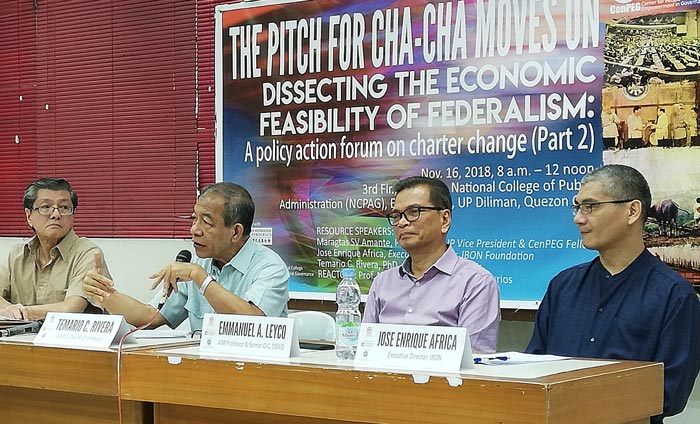
Thus stressed Temario C. Rivera at CenPEG’s half-day conference on the economics of the proposed federal republic held on Nov. 16, 2018. The conference, “Dissecting the economic feasibility of federalism,” was held at the National College of Public Administration and Governance (NCPAG) in UP Diliman campus. Professor Rivera is also CenPEG’s current chair.
CenPEG’s first one-day national conference on charter change was held in February 2018 in partnership with the Center for Integrative Development Studies (CIDS) and the Political Science Department, both of the University of the Philippines.
In his paper on Nov. 16, “Pursuing essential developmental reforms without federalizing,” Rivera said that the country’s most compelling problems including lack of industrial development and agrarian reform are best addressed through “coherent national policies and strengthened national institutions working closely with local government units (LGUs).”
In fact by history, he said, the Philippines has long been decentralized administratively as well as through the long presence of family dynasties or “local bosses.” Without resorting to a new federal form of government – which will further entrench local dynasties and make progressive forces difficult to rise – what can be done under the country’s present unitary system are political reforms. Such reforms, he explained, include strengthening national agencies, having stronger decentralized authorities, and instituting a real political party system.
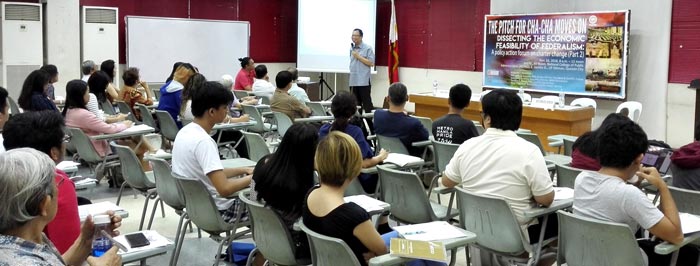
Former UP Vice President Maragtas SV Amante said, federalism “cannot be reduced to a simple sharing of revenues, without taking stock of the expenditure requirements and the political context in each of the proposed federal regions.”
In his paper, “Proposed federal republic of the Philippines: “Costs and benefits,” Amante, also a CenPEG Fellow, said federalism is not just about political restructuring of power or redistribution of economic and financial resources. “The great leap from fiscal federalism to development outcomes requires structural and systemic factors behind inequity, maldistribution, imbalances and distortions in assets and resources that need to be clearly identified, targeted and decisively addressed,” he said.
Taking off from Amante’s paper, IBON Foundation executive director, Jose Enrique Africa, said the Philippines shows a sharp uneven development of regions with only three regions including the National Capital Region enjoying a relatively high GDP and manufacturing. But even in these top three regions, income inequality and poverty are most stark like the rest of the country.
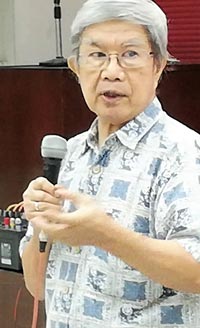
Shifting to another form of government system such as federalism is not the solution, Africa said. The roots of the country’s underdevelopment and widespread poverty cannot be outrightly be attributed to a weak structure of government but to bad national economic policies, the elite’s capture of economic resources and gains, as well as the concentration of political power in the elite, he added.
“Philippine underdevelopment,” Africa said, “most of all stems from the lack of structural transformation in the economy — particularly unresolved and even worsening industrial backwardness astride increasingly market-oriented social policy. Regional differences and neglect exist but they are not the cause of underdevelopment.”
Like the other conference speakers, Africa said “The country does not need to federalize to develop while a wide range of measures can immediately and progressively be taken to advance the economy and improve the lives of tens of millions of Filipinos across the country. Among others these include correcting the historical lack of national industrialization which is arguably the biggest factor in national and regional underdevelopment. Indeed, shifting to federalism now even invites grossly unnecessary political and economic risks and sets back the cause of Philippine development and progress even more.”
The conference panel of reactors were Prof. Emmanuel Leyco, who teaches finance at the Asian Institute of Management (AIM) and former OIC of the Department of Social Welfare and Development (DSWD); and Hector Barrios, a former bank executive and CenPEG Fellow.
Attended by academic scholars, students, policy researchers, and media personalities the conference on the economics of federalism was co-hosted by the Dean’s office of NCPAG and in cooperation with the Taiwan Foundation for Democracy (TFD).
CenPEG Director for Policy Studies, Prof. Bobby M. Tuazon, acted as the conference anchorperson. NCPAG OIC, Prof. Ebinezer R. Florano, gave the opening remarks.
President Rodrigo Duterte recently created an inter-agency task force led by the Department of Interior and Local Government (DILG) to fast-track the campaign for a federal form of government. The legislative process toward a new form of government will likely begin after the May 2019 mid-term elections. CenPEG News
(EDITOR’S NOTE: Readers who wish to receive electronic copies of the main conference powerpoint presentations can email: cenpeg.info@gmail.com CC info@cenpeg.org)
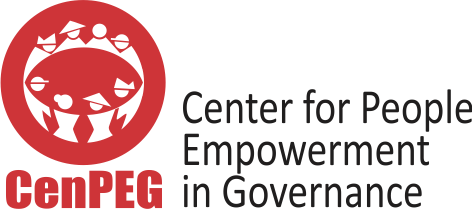


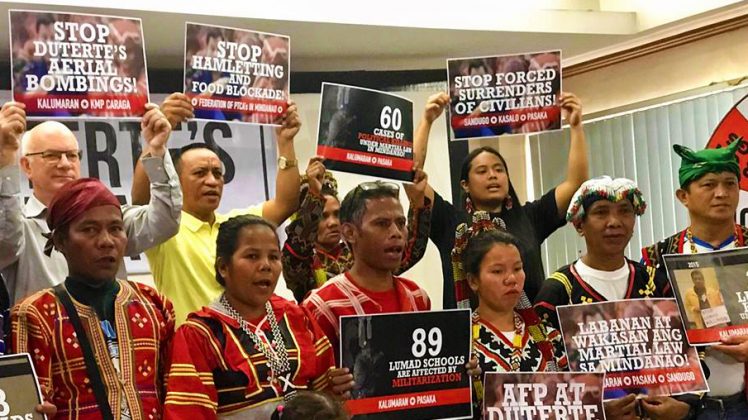
Leave a Reply